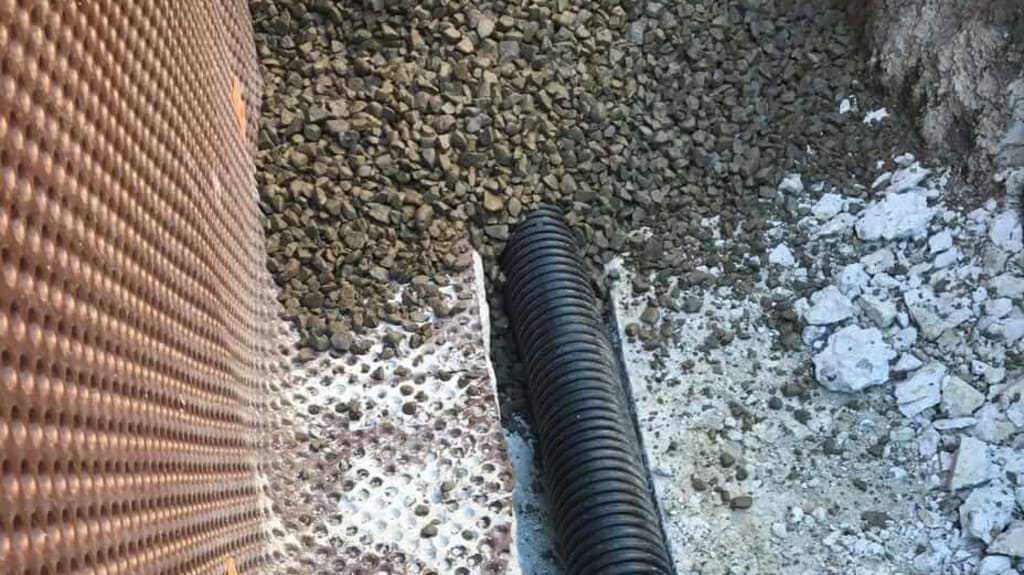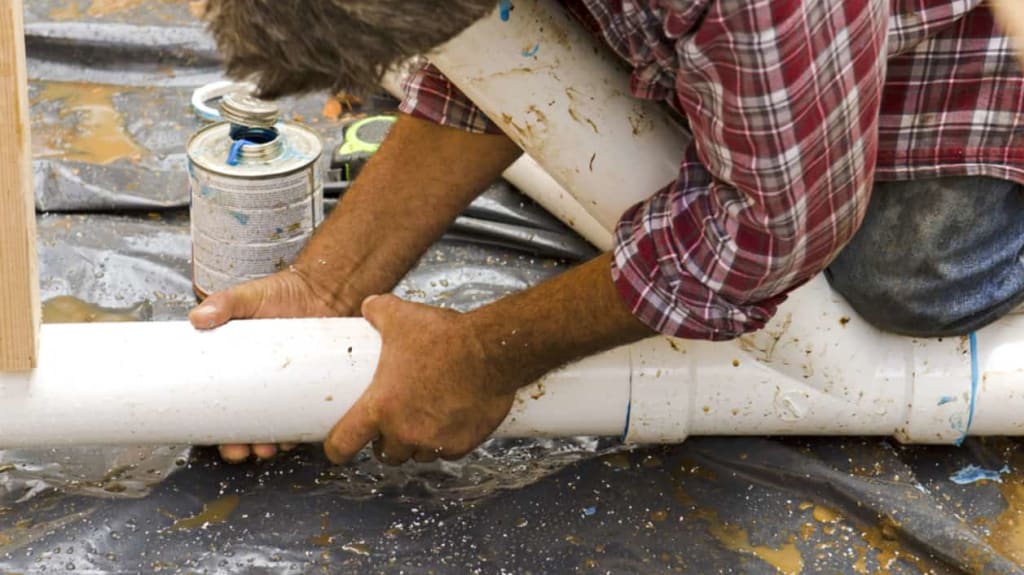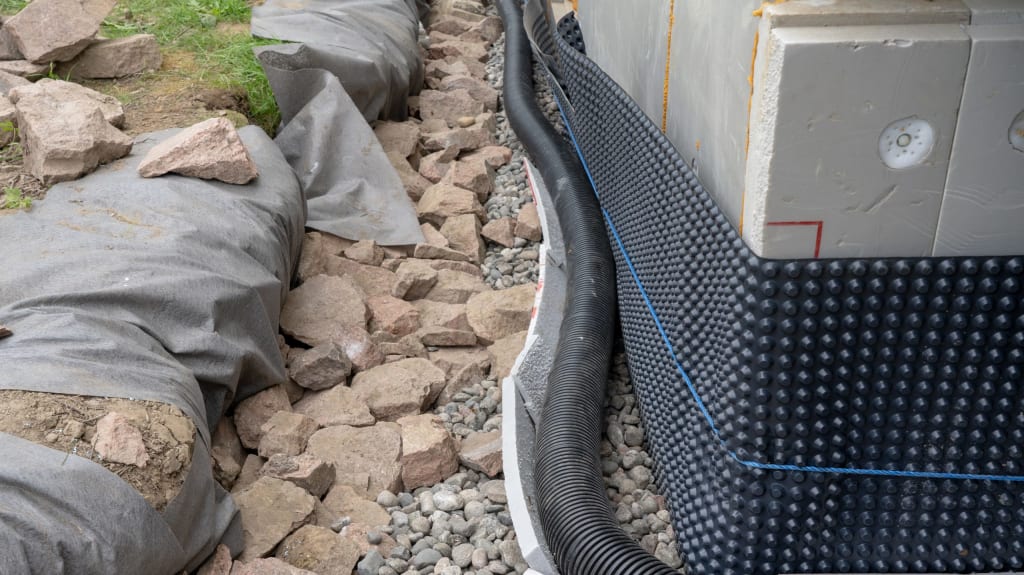Your home has an outer layer of insulation to keep you warm during the winter, but it also needs a waterproofing layer for the spring thaw – a French drain (weeping tile). If you’ve noticed leaks in your basement, cracks in the foundation wall, or water pooling in your backyard, you may have French drain problems that need to be addressed.
In short, a French drain is a ditch with a perforated pipe covered in gravel. It redirects precipitation like thawed snow and rainfall around your home and into the local sewer system, protecting your foundation from water damage. Failing weeping tile can cause a lot of problems, including basement floods! To avoid emptying your wallet, let’s go over a few common problems with weeping tile and how to repair them.
Signs of a French drain problem
Don’t worry, you won’t have to dig up your weeping tile. Instead, if you notice any of the following problems in your basement, take some time to determine the source and get them repaired before it gets worse.
Cracks in the foundation
If you see a crack in the foundation of your home, it was likely caused by your French drain (or lack of one). Small cracks can be repaired by a contractor – they’ll use epoxy to fill them in, which will prevent them from getting larger over time. That said, if the crack is large or wide and appears to be expanding, you may need to renovate your foundation.
While fixing large cracks involves extensive work, potentially requiring a structural engineer in addition to a French drain expert, it’s best to repair them quickly. They can cause several long-term complications, including
degrading your home’s appearance;
humidity problems; and
threatening the structural integrity of your home.
The sooner you figure out what’s causing the crack, the sooner you can fix it. If your French drain is the cause, you can call a specialized French drain contractor to remedy the problem.

White powder on concrete slab (efflorescence)
If you see a white powder building up on the concrete walls of your basement, then you may have a moisture problem or leak. Just like efflorescence on masonry, this powder is formed by water evaporating and leaving salts and other minerals behind. Leaks in particular can cause a major crack in your foundation, as well as humidity problems, mould, rot, and, over time, structural integrity issues.

Presence of mould
Mould is caused by high humidity levels. If it’s in your basement bathroom, it may mean that you need a better ventilation fan. If you find it somewhere else, such as at the bottom of a wall, it could mean that you have a leak in your foundation caused by your weeping tile. Be sure to get it fixed quickly to avoid any further damage to your home.

Water infiltration in the basement
Water leaks are usually the cause of every other type of issue you’ll run into in the basement. If you notice a leak, be sure to get it repaired as soon as you can to prevent further damage to your foundation. That said, water leaking into your basement after heavy rainfall or snow melting is a sign that your weeping tile may be clogged. You can try using a specialized drain cleaner, but chances are that you’ll need to get it repaired or replaced by a professional.


Thinking of renovating?
Common French drain problems
Now that you know what to look for, here are the three most common French drain problems that you’ll run into.
Clogging
Weeping tile allows water to slowly drain through the soil. Since water drags sediment as it drains, sand and other particles can work their way into the perforated holes of your pipe and cause it to clog. Now, normally the drainage membrane installed over the gravel prevents this, but sometimes it isn’t installed properly, or it gets damaged over time. This leads to blockage problems sooner than expected.
Also, if you live in an area with sandy, iron-rich soil, iron ochre may be causing the problem. This reddish sludge will not only clog your French drain but also increase the risk of leaks in your foundation. Iron ochre occurs more frequently when the foundation is exposed to very wet soil, such as on waterfront properties.

Malfunctioning sump pump
If you have an interior French drain (installed under the concrete slab), a sump pump is necessary to help prevent flooding. Be aware that entry-level models will probably need to be replaced sooner than their more expensive counterparts. Also, install a backup battery in case of power malfunctions and outages. You don’t want the pump to stop working during a storm – it may flood your basement.
Changing slope
As a house ages, the soil around it will inevitably get displaced by inclement weather, high winds, and melting snow. This can change the slope of the soil around the home and cause your weeping tile to work less efficiently. It’s a big problem for homes built near the water or in humid climates, as well as new homes where the soil hasn’t settled just yet. This process has likely already taken place for older homes, so be sure to check if your French drain is still functioning as intended.
Drain your water, not your wallet
French drain problems can cause a fair bit of damage to your home, from small foundation cracks to severe flooding and mould. Keep an eye out for the tell-tale signs of broken or clogged weeping tile and get it repaired as soon as you can. It’ll prevent further damage to your home, which means less unexpected renovations and repairs down the line.
If you don’t have a French drain yet or are considering replacing your current one, feel free to browse our updated costs. When you’re ready to get started, our Renovation Advisors will be here to help you find the perfect Verified Contractor for your French drain project.




